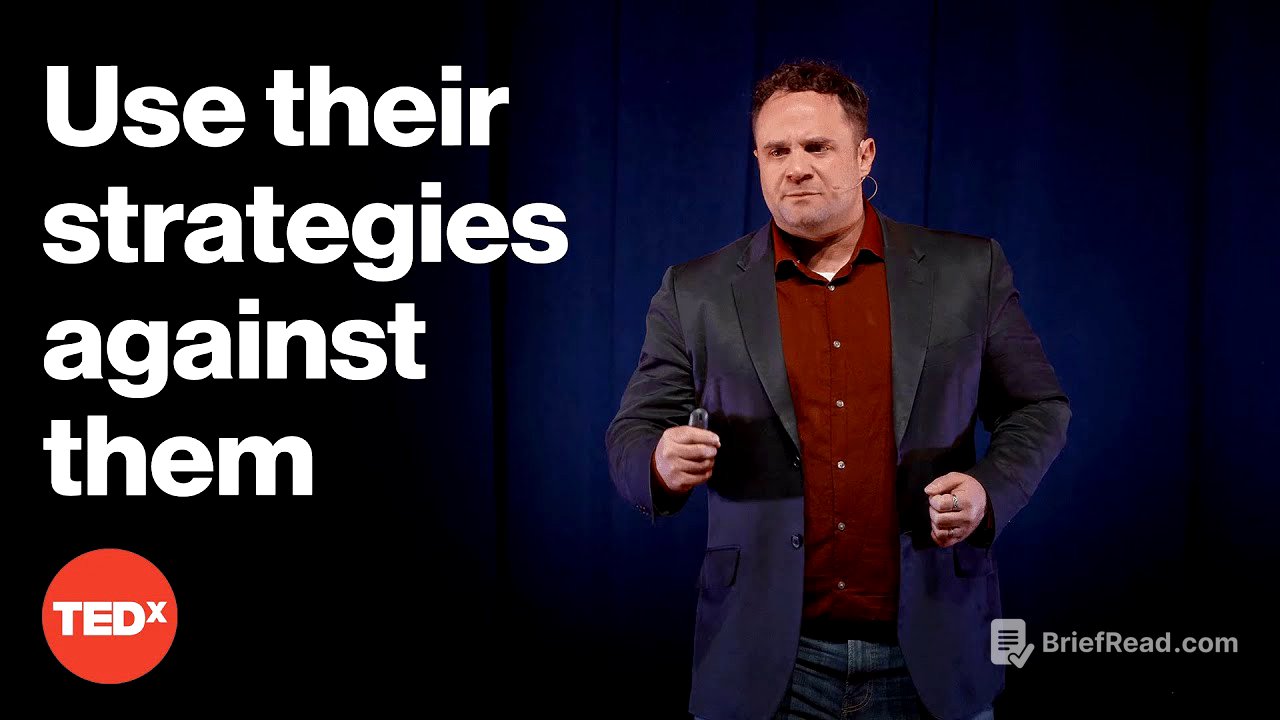TLDR;
The TEDx talk addresses the pervasive issue of manipulation, emphasizing the importance of recognizing and countering manipulative tactics. It introduces the "Dark Triad" of personality traits—psychopathy, narcissism, and Machiavellianism—and focuses on Machiavellianism as a strategic form of manipulation. The talk advocates for using the "CBR" (Cold, Bottom line, Rational) method to navigate interactions with manipulative individuals, particularly in unavoidable situations like toxic workplaces, while also cautioning against adopting manipulative behaviors.
- Understanding the Dark Triad traits, especially Machiavellianism, is crucial for recognizing manipulation.
- The CBR method (Cold, Bottom line, Rational) can help manage interactions with manipulative individuals by remaining emotionally detached, focusing on personal bottom lines, and making rational decisions.
- It's important to maintain ethical boundaries and avoid becoming manipulative oneself while defending against manipulation.
Introduction: Recognizing and Addressing Manipulation [0:03]
The speaker introduces the common experience of being manipulated, highlighting that it's more prevalent than people realize. She criticizes the lack of practical strategies provided by the science of manipulation to help individuals protect themselves. The talk aims to bridge this gap by teaching how to recognize manipulative people and turn their tactics against them, especially given the prevalence of manipulation in various contexts like romance schemes, investment fraud, and the workplace.
The Dark Triad: Psychopathy, Narcissism, and Machiavellianism [1:55]
The speaker discusses the "Dark Triad," comprising psychopathy, narcissism, and Machiavellianism, noting that these traits are often studied in isolation despite their interconnectedness. Machiavellianism, named after Nicolo Machiavelli, involves a strategic and rational approach to gaining power through manipulation. Individuals high in Machiavellianism are exceptionally dangerous due to their long-term planning and lack of obvious warning signs.
The Strategic Nature of Machiavellianism [3:59]
The speaker contrasts Machiavellianism with psychopathy and narcissism, emphasizing that Machiavellians are strategic in their manipulation. Unlike psychopaths, who are impulsive, and narcissists, who are driven by ego, Machiavellians carefully weigh the pros and cons of their actions to maximize personal benefit. They adapt well to their environment, even thriving under destructive leadership by maintaining better mental health and achieving higher promotion rates.
Ethical Defense: Harnessing Machiavellian Tactics for Good [6:51]
The speaker explores the potential for harnessing non-toxic elements of Machiavellianism to help individuals defend against manipulation. Drawing parallels with books like "The Art of War" and "48 Laws of Power," she suggests using deceptive strategies for self-defense while cautioning against becoming manipulative. The key is to remain emotionally guarded, treat interactions rationally, and focus on one's bottom line without succumbing to emotional reactivity.
The CBR Method: Cold, Bottom Line, Rational [8:35]
The speaker introduces the "CBR" method as a way to navigate toxic relationships:
- Cold: Remain emotionally guarded to prevent manipulators from exploiting your emotions.
- Bottom Line: Focus on your personal goals and craft responses that maximize outcomes for yourself and your family.
- Rational: Make decisions based on outcomes rather than appearances, recognizing that manipulative individuals lack principles.
This tactic is reserved for dealing with manipulative individuals as a last resort, and it's not applicable in healthy relationships.
Conclusion: Awareness and Preparedness [10:53]
The speaker concludes by emphasizing the importance of understanding the Dark Triad traits and being prepared to face manipulation. By studying Machiavellianism, individuals can recognize strategic manipulation and potentially turn the tables on manipulators. The CBR method provides tools to handle manipulative situations, and the hope is that future research will focus on practical ways to deal with these traits in real-world scenarios.









